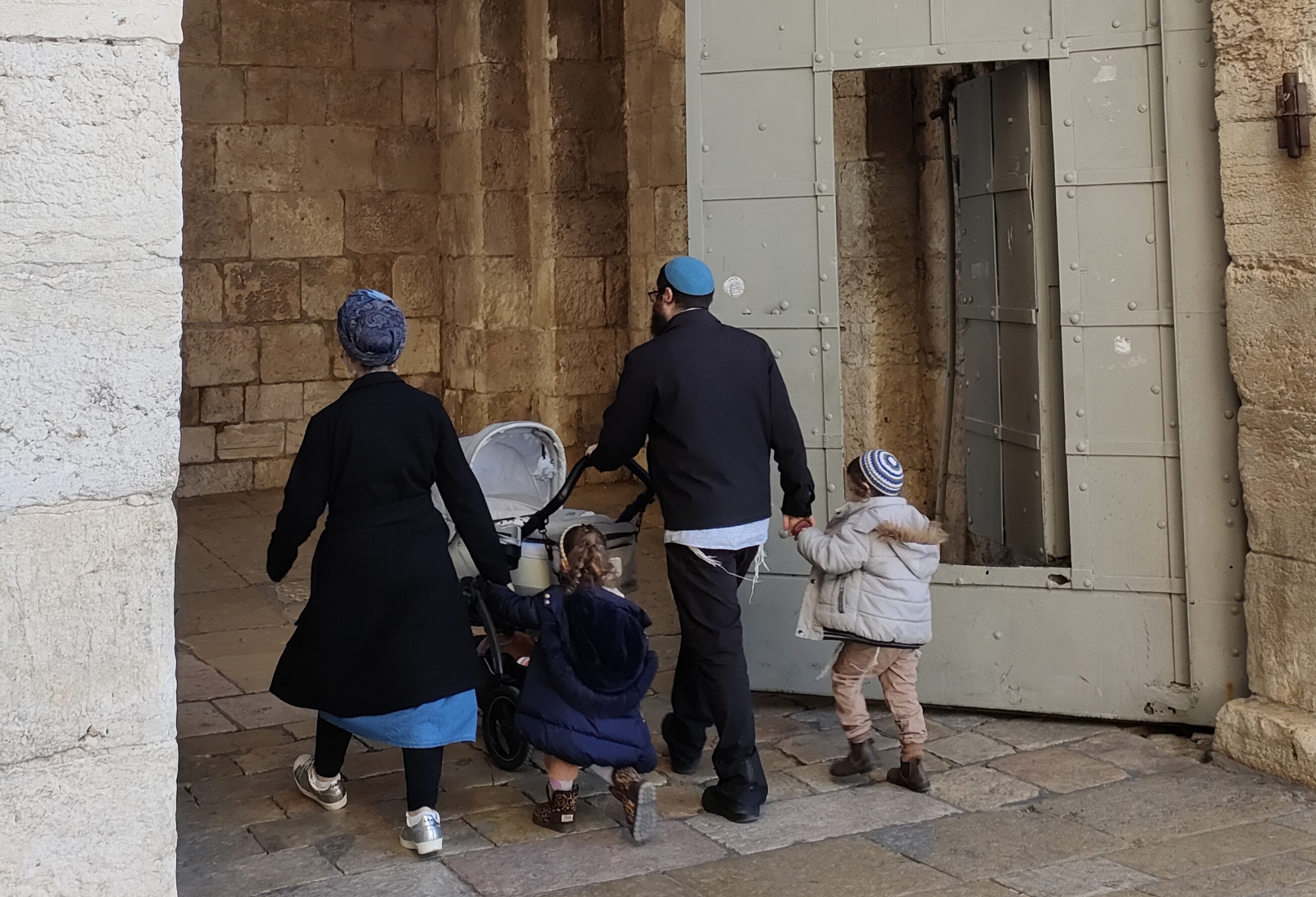Image: United Arab Emirates flight over Tel Aviv-Yafo (Joppa) and the Mediterranean Sea, Israel, January 2023.
By Samantha Patrick – Founder CEO
There is great value in understanding historical geography when reading scripture. My search for understanding of the place called Ninevah has led me to gain greater insight into the person of Jonah and the character of God.
According to ACARA’s National Literacy Learning Progressions, the book of Jonah can be categorised as a ‘sophisticated text’, as it contains vocabulary that is geographically, culturally and historically specific, and addresses complex themes, such as politics and religion. To gain a deeper understanding of this text, I must engage in historical, geographic inquiry specific to the Middle East.
This is a study of the book of Jonah, a pre-exile prophet. Jonah is 4 chapters in length and a very interesting read. My thoughts on this book of the Bible have been presented in the form of ‘notable points’ that arose as I read the scriptures, asked questions and travelled down many paths of research to discover concepts I had neither realised nor had I put much thought into. Scriptures cited here have been taken from the Complete Jewish Bible and the New King James Version.
My first point of reference was to identify Ninevah’s place in the world and it significance. I discovered that, “Ninevah was the capital of the powerful ancient Assyrian Empire located in modern day northern Iraq.” (The British Museum, 2023, https://www.britishmuseum.org/collection/galleries/assyria-nineveh)
I searched for Assyrian kings who were referenced in the Bible and found, Tiglath Pileser lll, Sennacherib, & Shalmaneser V. This information helps me delve deeper into Ninevah’s connections to different Biblical events. My knowledge of Ninevah, its place in the world and the people, helps me take a different perspective when I read the Biblical narratives. I am more able to remove myself from my own frame of understanding that is influenced by my life experiences and the culture I live in, to understand the text with the lense that it was intended to be viewed through.
Point 1 – monotheistic vs polytheistic world view
To break these words down, ‘mono’ means one and ‘poly’ means more than one. Theistic means to have a belief in a god, whether that be one or many. Someone who has a monotheistic world view believes that there is only one god. This world view is in contrast to someone who has a polytheistic world view, meaning they believe there is more than one god.
The people of Ninevah weren’t Jonah’s own people. They were worshipping a collective of other gods, which is significant because Jonah (the Hebrews) have a monotheistic world view. This means that they believe there is only one God, whose name is Yahweh. This causes me to think more deeply about Jonah’s anger. The God he serves is giving the people of Ninevah the opportunity to repent and be forgiven of their idolatry. For Jonah, someone who knows the laws of God and despises the worship of other gods, this must seem ludicrous.
Point 2: the fear of the Lord
Ninevah was a major political and administrative centre and was known as the largest city in the world for about 50 yrs. It housed one of the 7 wonders of the ancient world – The Hanging Gardens of Babylon. Regardless of the extravagance of this city, God instructs Jonah to warn them that if they don’t repent, He will overthrow them! Their response of fear toward the God of the Hebrews gives greater insight into people’s perception toward the God of the Hebrews at the time. They must have had the fear of God in them. They must have known His power. To act in such a way causes me to believe that they must have known that He could overthrow the city and destroy them in an instant. This causes me to wonder about the fear of the Lord in the present day. Has it been lost among the Gentiles? What would it take for it to return and for it to lead people into repentance?
“They [The Hanging Gardens of Babylon] may not have been located in Babylon. The gardens, famous as one of the Seven Wonders of the Ancient World, were, according to Stephanie Dalley, an Oxford University Assyriologist, located some 340 miles north of ancient Babylon in Nineveh, on the Tigris River by Mosul in modern Iraq.” (National Geographic, 2023, https://www.nationalgeographic.com/science/article/130531-babylon-hanging-gardens-nineveh-seven-wonders)
Point 3: the fear of the Lord from another perspective
Interesting also that even though the people of Ninevah appeared to know how powerful the God of the Hebrews is, they still had previously continued worshipping a collective of other gods. It seems that the real fear of God didn’t enter until God got personal with them – “In 40 days, Ninevah will be overthrown!” Jonah 3:4 CJB. The text doesn’t even say that Jonah instructed them to repent. Jonah proclaimed only that Ninevah would be overthrown in 40 days. This may be a reflection of Jonah’s feelings toward the matter, but regardless of the limited information, the people of Ninevah knew what they needed to do. They repented. They must have known who Jonah was – a Hebrew. That’s some serious authority on God’s part.
Point 4: Grace & Judgement
What is also encompassed in this historical narrative is an image of God’s character, which is in contrast to the character that Jonah is portraying.
Despite knowledge of the sin of the people, God shows mercy, grace and love. His act of love, demonstrated through his stern warning, saturates the whole old testament. Over and over, people are given the opportunity to repent. Whether they choose to or not is up to them, but the consequences demonstrate God’s sovereignty. He is King of Kings and Lord of Lords and can overthrow even a pantheon of gods contained in the biggest, most extravagant city in the known world. Even the fear of that causes some to repent, but for others, maybe God’s act of judgement itself is an act of love that would cause some to realise who He is.
I recall my time in Israel when we saw the destruction of Sodom and Gomorrah. Our time there traversing the remains of what appeared to be ash mountains caused a reverent fear of God in me to go to another level. An event that happened over 2000 years ago still lays the landscape bare to this day. The brimstone (sulphur) that fell from the sky millenniums ago could be held in my hands and the smoke of its smoldering after we lit it on fire could make me cough and gag here in the 21st century.
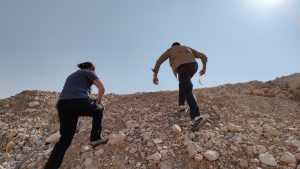
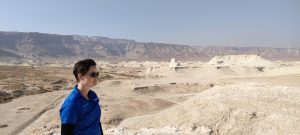

Video and photographs: Sodom & Gomorrah and the Dead Sea, Israel, January 2023. Featuring Chaim Singerman, Samantha Patrick and Jenny Pursehouse.
Even amidst this event, God’s love and mercy is revealed through a man named Lot, who was saved. If we are willing to follow God and not look back to the old way of living, we too will receive the life that is offered to us. It may appear that God is harsh, but the reality is that he is holy and full of glory, and He made a way for us to be in His presence. He cannot be in the presence of sin. That’s why we need Jesus. He stands between us and God the Father so that through Jesus, the perfect, holy and blameless one, we are also seen as perfect, holy and blameless. It is undeserved, yes. But that is Grace. Jesus is the only way for us to enter the Kingdom of God. “Yeshua said, “I AM the Way — and the Truth and the Life; no one comes to the Father except through me.” John 14:6CJB. If we don’t choose to walk away from our sinful ways, such as the idolatry that we read about here in the book of Jonah, we cannot enter the Kingdom of God. His Kingdom is available to us here through His Holy Spirit and for eternity when He brings forth the new heaven and the new earth, and the New Jerusalem comes down out of Heaven.
“Also I saw the holy city, New Yerushalayim [Jerusalem], coming down out of heaven from God, prepared like a bride beautifully dressed for her husband.” Revelation 21:2
In contrast to a God of forgiveness and mercy, Jonah’s depiction is indeed the opposite. Unforgiveness. Jonah just couldn’t grasp how God could forgive these people. It shows the depth of God’s love. It is beyond what we can comprehend. The city deserved destruction for their idolatry, but God was stepping in to save them. What He has in return is abundant life, for both the Jew (Jonah) and the Gentile (Ninevah).
“I will heal their backsliding, I will love them freely, for My anger has turned away from him. I will be like the dew to Israel; He shall grow like the lily, and lengthen his roots like Lebanon. His branches shall spread; His beauty shall be like an olive tree, and his fragrance like Lebanon. Those who dwell under his shadow shall return; they shall be revived like grain, and grow like a vine. Their scent shall be like the wine of Lebanon. “Ephraim [the northern kingdom of Israel] shall say, ‘What have I to do anymore with idols?’ I have heard and observed him. I am like a green cypress tree; your fruit is found in Me.” Hosea 14:4-8 NKJV
Point 5: a picture of what is to come
Image: Jonah went aboard a ship from Joppa. Tel Aviv-Yafo (Joppa), Israel, January 2023.

Jonah didn’t want the people of Ninevah saved – to the point where he ran from God. The journey towards the eventual salvation of Ninevah even took Jonah via the belly of a whale for 3 days and nights, but in this, God was giving me a bigger picture. I thought, ‘Though you are in danger of being swallowed up by death, life is given.’ For Jonah, this was his reality inside the whale, and so too was this the reality for Ninevah when they repented and destruction didn’t come.
While inside the whale, Jonah said, “For you threw me into the deep, into the heart of the seas; and the flood enveloped me; all your surging waves passed over me. I thought, ‘I have been banished from your sight.’ But I will again look at your holy temple. The water surrounded me, threatened my life; the deep closed over me, seaweed twined around my head. I was going down to the bottoms of the mountains, to a land whose bars would close me in forever; but you brought me up alive from the pit, Adonai, my God!” Jonah 2:3-6CJB. We too are saved from the horrible pit called hell, or hades as it is also known as, when we choose to follow Jesus. In the case of the book of Jonah, God was warning them. Their pantheon of gods were destined for hell and if the people of Ninevah continued to have allegiance to these gods, they would end up going with them. God, in all his love and mercy, gave them a way out. They chose life! Praise God!
Jonah’s journey via a whale is a picture of what would come. Something bigger. Something eternal. While Jonah’s life was physically preserved in the belly of the whale, having not physically died, Jesus demonstrated that even life after our physical bodies die is preserved for us. Though Jesus was in the depths of the earth for 3 days and 3 nights, He rose again to life. His disciples watched Him rise into the clouds to be seated at the right hand of the Father in the Heavens, and He promised that He will prepare a place for us so that we too can be where He is. Life beyond our known world. Eternal life.
“For just as Yonah [Jonah] was three days and three nights in the belly of the sea-monster, so will the Son of Man be three days and three nights in the depths of the earth.” Matthew 12:40 CJB
Point 6: Yahweh’s power witnessed
When Jonah was on the boat set for Tarshish, we again see an example of non-Hebrew people afraid because they find out that Jonah is a Hebrew and he is running from God. They even feared perishing if they had blood on their hands and threw this man of God overboard, so they asked that God preserve their lives. After they threw Jonah overboard, the sea calmed. Man, what a sight to behold! It gives greater insight into the significance of them offering sacrifices and making vows to the God of the Hebrews after the storm calmed. They previously knew about this God, and now, they had just witnessed His power right before their very eyes. No longer was it just a second-hand story they heard from someone. They had now experienced the power of Yahweh first-hand. First-hand experience of the immeasurable power of God sure would cause someone to repent, believe in and vow to follow this incredible God who has control over the wind and sea.
Point 7: a new perspective on the exile of the Jews
My newfound understanding of the book of Jonah has now had me thinking more deeply about other biblical narratives. I now find it very interesting that it was the Assyrian Empire who later conquered Israel, and the Jews were exiled from their land. Ninevah was the capital of the Assyrian Empire.
“Then the king of Assyria carried Israel away captive to Assyria, and put them in Halah and by the Habor, the River of Gozan, and in the cities of the Medes, 12 because they did not obey the voice of the Lord their God, but transgressed His covenant and all that Moses the servant of the Lord had commanded; and they would neither hear nor do them.” 2 Kings 18:11 NKJV
2 Kings 18:17-37 gives the account of the king of Assyria’s pride amidst this event. Yes, God had given power into his hands to take the northern kingdom, Israel, into captivity and remove them from their land, but when it came to Jerusalem, the capital of the southern kingdom, Judah, God demonstrated His authority. God has ultimate power and control over what happens. The Jews heeded the instructions of the prophet, Hezekiah, and therefore were victorious. Hezekiah’s tunnel, built during this time, can be walked through to this day. During my travels in Israel in January, 2023, I chose to immerse myself in the ‘wet tunnel’ where you wade knee deep in water for about 20 minutes under torch light.
2 Kings 18:17-37 – https://www.biblegateway.com/passage/?search=2+kings+18%3A17-37&version=CJB
2 Chronicles 32:1-23 – https://www.biblegateway.com/passage/?search=2+Chronicles+32%3A1-23&version=NIV
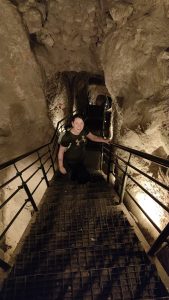


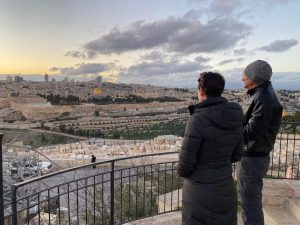
Images: walking through Hezekiah’s tunnel and standing on the Mount of Olives overlooking Jerusalem where Hezekiah’s tunnel was built. Israel, 2023.
In Summary
I am thankful for the time I have spent engaging in historical, geographic enquiry and for all that the Lord has revealed to me through His word. It has deepened my understanding of the interactions between God and people. A God who is unseen is very present in the lives of people recorded in the Bible and continues to be today. The prophets who lived during biblical times, just like Hezekiah, foretold things that would happen well into the future, even after the present day. Just like the people on the boat to Tarshish and the people of Ninevah, we too can recognise that Yahweh holds true to His word and holds supreme power. He sent His Son, Jesus Christ, to demonstrate his love for all mankind. Our receiving of this undeserved forgiveness is up to us. Will you repent like we have seen through the people in this historical account, or will you continue in your ways? Ask the Lord to reveal Himself to you so that you may personally encounter Him.
“Therefore, repent and turn to God, so that your sins may be erased; so that times of refreshing may come from the Lord’s presence; and he may send the Messiah [second coming] appointed in advance for you, that is, Yeshua [Jesus]. He has to remain in heaven until the time comes for restoring everything, as God said long ago, when he spoke through the holy prophets.” Acts 3:19-21 CJB
“The soldiers too ridiculed him [Jesus]; they came up, offered him vinegar and said, “If you are the king of the Jews, save yourself!” And there was a notice over him which read, THIS IS THE KING OF THE JEW. One of the criminals hanging there hurled insults at him. “Aren’t you the Messiah? Save yourself and us!” But the other one spoke up and rebuked the first, saying, “Have you no fear of God? You’re getting the same punishment as he is. Ours is only fair; we’re getting what we deserve for what we did. But this man did nothing wrong.” Then he said, “Yeshua [Jesus], remember me when you come as King.” Yeshua said to him, “Yes! I promise that you will be with me today in Gan-`Eden.” Luke 23:36-43 CJB

Image: standing in the Mediterranean Sea with Tel Aviv and Joppa behind me. Tel Aviv-Yafo (Joppa), Israel, January 2023.



